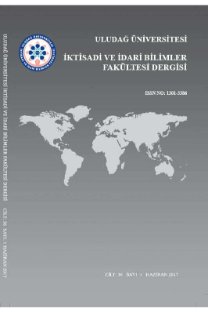Elektronik Ticaretin Ticari ve Mali Etkileri: Dünya ve Türkiye Üzerine Bir Değerlendirme
Bilgi ve iletişim teknolojilerinde meydana gelen hızlı gelişmelerle giderek yaygınlaşan elektronik ticaret, uluslararası mal ve hizmet ticaretini geliştirici etkilere yol açmaktadır. Ancak, olumlu etkilerine karşılık bu ticaret şekli bazı tartışmaları da beraberinde getirmiştir. Bunlar arasında son dönemde en çok öneçıkanı, bu ticaretten doğan mali kayıplar ve sınır ötesi e-ticaretin vergilendirilmesi sorunudur. Tüm dünya ölçeğinde e-ticaretten doğan mali kayıplar kısa vadede fazla olmayacak, ancak gelişmekte olan ülkeler tarife gelir kayıplarından gelişmiş ülkelere göre daha çok etkileneceklerdir. Bu yüzden, Türkiye gibi gelişmekte olan ülkelerin internet vergileme kurallarını uyumlaştırma girişimlerini yakından izlemeleri ve vergi kayıplarını telafi edebilmek için e-ticaretle ilgili beşeri ve teknik altyapıyı biran önce oluşturmaları gerekmektedir.
Commercial and Fiscal Effects of Electronic Commerce: An Assessment on the World and Turkey
An electronic commerce, which has been prevalent due to the fast improvements in information and communication technologies, has developed international goods and services trade. Although a consensus occurred on its positive effects, some new discussions have also been brought on the effects on the e-commerce. Two of the most important discussions at the present time are fiscal losses due to the e-commerce and taxation problems of crossborder e-commerce.Fiscal losses due to the e-commerce will not be much in the short term at the world level, however, developing countries will lose tariff revenue more than the developed countries. Thus, developing countries, like Turkey, closely follow the improvements in internet taxation rules and build up social and technological infrastructure related to the e-commerce to compensate tax losses.
___
Akçay, Selçuk (2003), “The New Economy: A Survey”, Ekonomik Yaklaşım, Cilt: 14, Sayı: 44-46, ss. 57-70.Ankara Sanayi Odası (1998), Asomedya, Ağustos.
Coppel, Jonathan (2000), “E-Commerce: Impacts And Policy Challenges”, OECD Economics Department Working Papers, No. 252.
Ekin, Nusret (1998), Bilgi Ekonomisinde Elektronik Ticaret, İTO Yayınları, İstanbul
Elektronik Ticaret Koordinasyon Kurulu (1998), E-Ticaret Raporu, Mayıs.
Goldstein, A. ve D. O’Connor (2000), “E-Commerce for Development: Prospects and Policy Issues”, OECD Development Centre Technical Paper, No. 164.
Golsbee, A. (1999), “In a World Without Borders: The Impact of Taxes on Internet Commerce”, NBER Working Paper, No. 6863.
Kepenek, Yakup (1999), “Ekonomik Yönleriyle Elektronik Ticaret”, www.google.com, 23-02-2003.
Mattao, A. ve L. Schuknecht (2000), “Trade Policies for Electronic Commerce”, World Bank Policy Research Working Paper, No. 2380.
Mattoo, A., R. Perez-Esteve ve L. Schuknecht (2001), “Electronic Commerce, Trade and Tariff Revenue: A Quantitive Assessment”, The World Economy, Vol. 24, No. 7, pp. 955-970.
Söylemez, Alev S. (2001), Yeni Ekonomi, Boyut Kitapları, İstanbul.
Teltscher, Susanne (2000), “Tariffs, Taxes and Electronic Commerce: Revenue Implications for Developing Countries”, UNCTAD Working Papers, UNCTAD.
Teltscher, Susanne (2002), “Electronic Commerce and Development: Fiscal Implications of Digitized Goods Trading”, World Development, Vol. 30, No. 7, pp. 1137-1158.
UNCTAD (2000), “Building Confidence-Electronic Commerce and Development”, UNCTAD Discussion Papers, www.unctad.org, 15-04-2003.
UNCTAD (2002), E-Commerce and Development Report 2002, www.unctad.org, 15-04-2003.
Yazıcı, Ayla (2002), “Elektronik Ticaretin Ekonomik Boyutu”, Anadolu Üniversitesi İktisadi ve İdari Bilimler Fakültesi Dergisi, Cilt: XVIII, Sayı: 1-2, ss. 85-103.
- ISSN: 1301-3386
- Yayın Aralığı: Yılda 2 Sayı
- Başlangıç: 2018
Sayıdaki Diğer Makaleler
Şans Oyunlarına İlişkin Bir Araştırma
Öngörü Tekniklerinin Doğruluk Kıyaslaması: Basit Ekonometrik, ARMA ve ARMAX Teknikleri
Sistematik Risk Tahmininde Getiri Aralığının Etkisi: İMKB'de Bir Uygulama
Büyük Bir İktisatçının Metafizik Değer Yargılarına Bakışı: Joseph A. Schumpeter'in Vizyon Kavramı
Kriz Yönetimi: Teori, Tartışma ve Türkiye Örneği
Hüdaverdi BİRCAN, ZAFER KARTAL
Elektronik Ticaretin Ticari ve Mali Etkileri: Dünya ve Türkiye Üzerine Bir Değerlendirme
Bootsrap Yönetiminin Ridge Regrasyonda Uygulanması
Artık Getirilerde Haftanın Günü Firma Büyüklüğü ve Takas Süresi Etkisi
